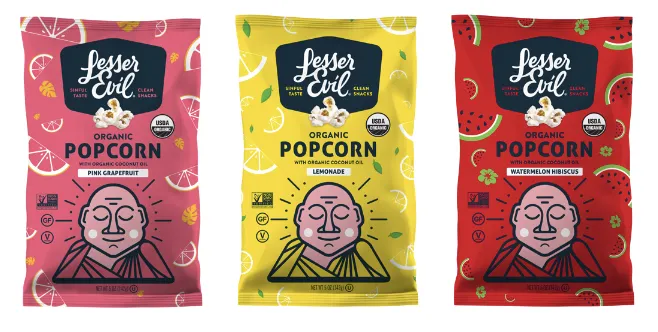Lesser Evil’s better-for-you kids snacks have ‘concerning’ amounts of lead: Consumer Reports

Dive Brief:
- Lesser Evil’s Lil’ Puffs, which feature ingredients like beets, carrots, potatoes and tomatoes, were found to have a “concerning” amount of lead, according to research conducted by Consumer Reports.
- The brand’s Intergalactic Voyager Veggie Blend had more lead per serving than any of the 80 baby foods the research company has tested since 2017. One product from Serenity Kids, its Tomato & Herb grain-free puffs offering made with bone broth, was also found to have high amounts of lead, the research said.
- The research tested six kids’ snacks made with cassava or sorghum and used the percentage of California’s maximum allowable dose level as a baseline for lead testing. Though there are no federal limits for lead in most foods, California’s standards are the most protective, according to experts from Consumer Reports.
Dive Insight:
Lesser Evil and Serenity Kids responded to Consumer Reports and said that they regularly test their raw ingredients and final products for heavy metals and “stand behind the safety of their products.”
James Rogers, head of food safety testing at Consumer Reports, recommends kids to have less than half a serving of the Intergalactic Voyager Veggie Blend of Lesser Evil’s Lil’ Puffs a day.
For the other two puffs with high lead levels — Lesser Evil’s Lil’ Puffs Sweet Potato Apple Asteroid and Serenity Kids’ Tomato & Herb, Bone Broth puffs — experts said to limit consuming more than 1 ½ servings a day.
“All Lesser Evil products adhere to current regulatory requirements,” a company spokesperson wrote to Food Dive in response to the report. “We are proud of the best-in-class products we’ve put on shelves, which all meet GRAS (Generally Recognized as Safe) standards and federal regulations for organic products. Food safety is a top priority and we conduct extensive testing for all Lesser Evil products that complies with California Prop 65 and federal standards.”
Serentiy Kids did not respond to request for comment in time for publication.
Lesser Evil said its Lil’ Puffs product line was designed to get kids “excited” about eating healthy.
The Intergalactic offering, for example, has ingredients like organic cassava flour, organic avocado oil, organic tapioca starch and organic red and green vegetable blends.
Some studies have shown that cassava and other root vegetables such as sweet potatoes, carrots, and beets, can have high lead levels, Consumer Report said.
In the report, Angelia Seyfferth, PhD, from the department of plant and soil sciences at the University of Delaware, explains that lead, which can occur naturally in soil or end up there due to pollution, tends to accumulate in a plant’s root system.
“Lead can’t move very well beyond the root itself, so it doesn’t get into the above-ground portion of the plant,” she said.
“Because there is no known safe level of exposure to lead, the FDA monitors and regulates levels of lead in foods,” the FDA said in a statement on guidance to the metal in foods. “While it is not possible to completely prevent lead from entering the food supply, for foods that contain lead, it may be possible to reduce the levels through changes to agricultural or manufacturing practices.”
Jennie Shen, director of brand marketing for Serenity Kids, said in the report that the company “is always working with our suppliers to reduce the heavy metal content of our products,” but notes that “heavy metals are prevalent in our food system.”
And Sami Rosnov, chief of operations at Corner Market Communications, which represents Lesser Evil, says that lead occurs in nature “due to years of pollution and contamination in our water and soil,” according to statements from Consumer Reports.
The FDA told Consumer Reports in a statement that “it will finalize its limits on lead in baby foods this year and on lead in fruit juices in 2025 but is still determining how to regulate heavy metals in snack foods.”
Source: fooddive.com

